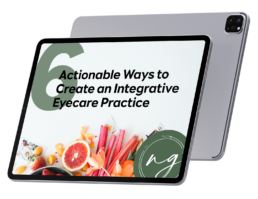Optometrists have traditionally focused on diagnosing and treating eye-related issues, such as refractive errors, cataracts, and glaucoma. However, as research continues to reveal the interconnectedness of the body’s various systems, it’s become increasingly apparent that eye health is not just a matter of what’s happening in the eyes themselves. Rather, vision-related problems can be symptoms of deeper underlying issues in other parts of the body. This is where integrative medicine comes in.
Incorporating integrative medicine into my optometry practice was a natural extension of my commitment to patient-centered care. By integrating complementary therapies, such as nutrition, lifestyle, and mind-body techniques, I can provide a holistic approach to traditional care that promotes overall health and wellness.
Integrative Medicine: The Holistic Approach
As an optometrist, my traditional focus has been diagnosing and treating eye-related issues such as refractive errors, cataracts, and glaucoma. However, I’ve come to realize that eye health is not just a matter of what’s happening in the eyes themselves. Rather, vision-related problems can be symptoms of deeper underlying issues in other parts of the body. This is where integrative medicine comes in.
As I’ve learned more about integrative medicine, I’ve come to appreciate its holistic approach to healthcare. By recognizing the body as a complex system of interconnected parts, integrative medicine emphasizes the importance of identifying and addressing the root causes of health issues, rather than just treating their symptoms. By bringing integrative medicine into my optometric practice, I can expand my ability to identify and treat underlying health problems that may be impacting my patients’ eye health.
One way that integrative medicine can benefit my practice is through nutritional counseling. I now recognize that many eye-related problems, such as age-related macular degeneration, cataracts, and glaucoma, have been linked to poor nutrition. By providing my patients with guidance on healthy eating habits and supplement options, I can help address the underlying causes of these conditions.
I’ve also started to focus on stress management as a way to improve my patients’ eye health. Stress has been linked to a variety of health problems, including eye strain, dry eyes, and even vision loss. By providing my patients with relaxation techniques, such as meditation or deep breathing exercises, I can help manage their stress and improve their overall eye health.

Six Actionable Ways to Create an Integrative Eyecare Practice
Get the free guide on how to integrative functional protocols in your eye care practice. Enter your details below and you will receive a download link.
Integrative medicine also emphasizes the use of natural and alternative treatments, which I’ve started to incorporate into my practice. For example, acupuncture has been shown to help relieve eye-related problems, such as dry eyes and visual disturbances. By offering such treatments, I can provide my patients with a wider range of options for managing their eye health.
Finally, by working with other healthcare providers, such as endocrinologists and primary care physicians, I can help manage the overall health of my patients, including their blood sugar levels, and improve their eye health as a result. This collaboration is especially important for patients with systemic health issues, such as diabetes, that can impact their vision.
In conclusion, by bringing integrative medicine into my practice, I can expand my ability to identify and treat underlying health problems that may be impacting my patients’ eye health. From nutritional counseling and stress management to natural and alternative treatments, there are many ways that integrative medicine can benefit optometry and help patients achieve better overall health and wellness.
—
How do I bring Integrative Medicine into an optometric practice?
If you have ever asked yourself these questions, the IVP offerings are the resource you’ve been looking for.
Dr. Neda Gioia is a licensed optometrist in New Jersey and New York with 15 years of clinical experience spanning 3 states. Her personal success in nutrition inspired her to pursue a formal education in functional medicine and clinical nutrition so that she could implement it into her practice.
She is the founder of Integrative Vision, an optometry practice with a special emphasis on nutritional interventions and functional medicine modalities for eye health.
Being an effective practitioner is a full time job in itself. Building a successful practice or business that allows you to grow, find financial stability, and implement the care you are passionate about can feel almost impossible.
When you choose to work with Dr. Gioia, you will gain valuable insight into how to optimize, revamp, and enhance your business.




